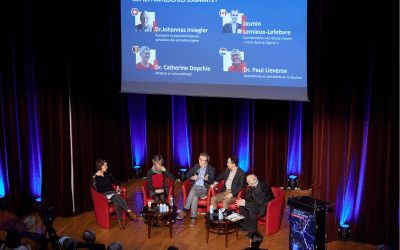A symposium was held on December 9th at the University of London, organized by Progress for Educational Trust (PET), a British registered charity. PET’s principal objective is to create an environment where ethically sound research and practice in genetics, assisted conception, and embryo and stem cell research can “thrive”. PET specifies that the ultimate beneficiaries of all their work are families and individuals threatened by infertility and genetic diseases.
This day was financed by private companies, research centers and the “wellcome trust” already implied in the common declaration of support for research and finance of genome modification methods, notably those linked to the use of the « CRISPR / cas9 » technique elaborated last September in the United Kingdom.
The day-long conference was entitled: From three-person IVF to genome editing: the science and ethics of engineering the embryo.
Chief scientific advisor to the UK government, Professor Sir Mark Walport, spoke on the theme “Why the UK should be leading the discussion on embryo engineering”. He announced “that he believes there are circumstances where genetic modification of human embryos could be acceptable and that the UK should open this path”. Already in England a request for permission was formulated by London’s Francois Crick Institute to the HFEA (Human Fertilization and Embryology Authority, the ethical authority for the country on human reproduction subjects) to proceed on experiments of genome modification of human embryos for research purposes, even if they are not intended to be implanted in a uterus for pregnancy. In February 2015, the British Parliament already gave the green light for in vitro conception of babies created from the DNA from three individuals, to eliminate the risk of transmitting a genetic disease from the biological mother. The first babies born with the DNA from 3 different parents could be born as soon as next year. These changes in their DNA will be transmitted to their own children.
Professor John Harris, who also spoke at the congress in Washington in December 2015, held a conference entitled « we must improve on evolution”.
Essentially this day was consecrated to modifications that are possible today for gametes and human embryos at an early stage of their development.
“IVF with 3 parents” and genome modification by CRISPR-Cas9 are cutting-edge genetic techniques, which affect human beings’ DNA, in a transmissible manner for future generations. They often involve serious ethical stakes, and we can ask ourselves the question: tomorrow will we be producing “custom-made babies”? How are we going to protect the human genome which is part of the heritage of humanity, and to totally exclude the risks of eugenics, as reminded recently by UNESCO?
The conclusions of the symposium will soon be published.



